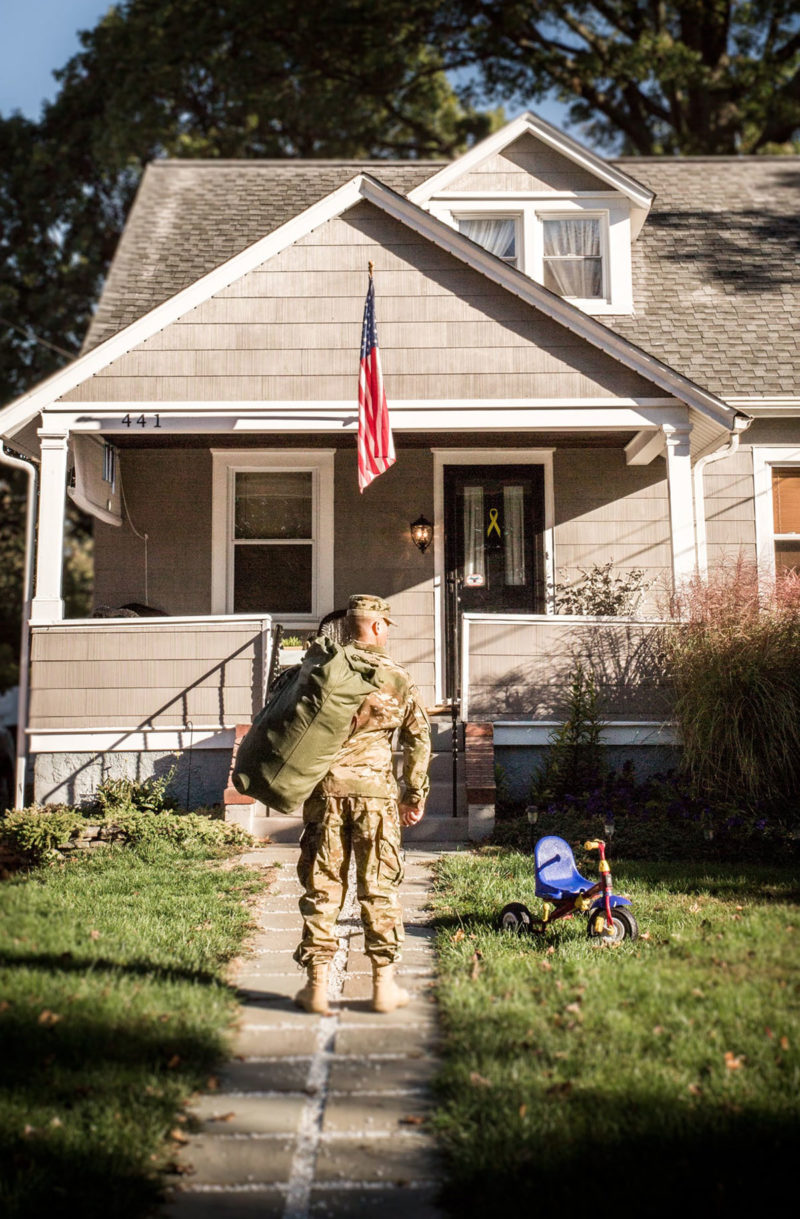Time for Realistic Expectation
Week Summary
What unrealistic expectations for reintegration are you willing to let go?
Happy yet sad. Relieved but anxious. Contrasting emotions and disappointment from unmet expectations during reintegration are normal. The returning Jews also had mixed emotions about their new temple. Some shouted for joy, while others focused on the negative instead of the possibilities that change brings. Rejoice in God’s gift of togetherness while allowing yourself to experience the emotional mash-up, trusting God to help you navigate a blessed future.
About This Journey
Reintegration is hard: it messes with rhythms and feels uncomfortable. “Reunited and Resilient” tells the story of how God stirred a king to change the trajectory of a nation. Follow along as God shows us how He can also stir your family’s hearts to reach for restoration as you journey toward reintegration following deployment.
This Week's Readings
The Reintegration Mash-Up
Read
But many of the priests and Levites and heads of fathers’ houses, old men who had seen the first house, wept with a loud voice when they saw the foundation of this house being laid, though many shouted aloud for joy, so that the people could not distinguish the sound of the joyful shout from the sound of the people’s weeping, for the people shouted with a great shout, and the sound was heard far away.
-Ezra 3:12-13Reflect
Relieved because he is home, but anxious for the adjustments we will have to make in the days ahead.
Happy because he is part of the family again, but sad for a loss of my personal independence.
Excited because we can make plans, but apprehensive for the emotional minefields through which we may have to walk.
Peaceful because he is close, but worried for the possibility of another deployment.
Grateful because we can share responsibilities, but frustrated to relinquish the way I have done things while he was away.
Such is the reintegration mash-up. Pop culture defines a mash-up as a mixture or fusion of contrasting elements. Modern day singers have made the musical mash-up popular, but they do not have anything on the reintegration mash-up.
The contrasting emotions you may feel during reintegration are normal. In fact, you need to expect an emotional mash-up. You cannot assume everything will be the same as it was before deployment. At the risk of sounding cliché, the best description is finding a new normal.
The returning Jews in the book of Ezra would have done well to know what to expect during reintegration. Notice the mixed emotions present in Ezra 3:12–13: Some shouted for joy, while others wept aloud. Notice too the reason for the weeping: things were not as they used to be. In remembering the temple before the exile, some focused on the negative which kept them from seeing the possibilities that change could bring.
Sisters, heed this advice from experience: You gain nothing by saying, “I wish things were like they were before you deployed.” Rejoice in the opportunity God has given you to be together again. Allow yourself permission to experience reintegration mash-up, but trust that God can help you navigate a good and blessed future.
Respond
In what ways have you experienced reintegration mash-up? How can you prepare yourself for or manage such conflicting emotions?
Prayer
Father, you created my emotions. I know I should not allow myself to be led by emotion more than I allow you to lead me. Help me not to live in the past or measure today by yesterday. Teach me to enjoy and appreciate today. Amen.
Discouragement: An Enemy to Defeat
Read
Then the people of the land discouraged the people of Judah and made them afraid to build and bribed counselors against them to frustrate their purpose, all the days of Cyrus king of Persia, even until the reign of Darius king of Persia.
And in the reign of Ahasuerus, in the beginning of his reign, they wrote an accusation against the inhabitants of Judah and Jerusalem.
-Ezra 4:4-6Reflect
Have you met my enemy, Discouragement? This enemy likes to show up when progress is slow, preying on hopes, dreams, and goals. Seeping into a heart through a word, a look or a thought, it can sap your will to move forward. Determined and calculated, it sets out to defeat. It showed up in the Old Testament book of Ezra as the people of God demonstrated signs of progress. Trust me; it will make an appearance in your home as you and your husband work toward building togetherness following a deployment.
Discouragement will always be an uninvited caller. Any time you work to build something for God, you will encounter opposition. My friend, your marriage is something God wants to build. Marriage is to be an example of God and his church. As such, you better believe there is a big bulls-eye on the marriage relationship and Discouragement will zero in on the target. Be aware of attempts to hijack any success. Recognize the attack and expect it to show up—and then fight it with God’s truth!
When fighting a battle, know your enemy. Discouragement is a tactic of the enemy of our soul, Satan. The word accusation used in Ezra 4:6 is translated from the Hebrew word sitna, a form of the word Satan, the adversary. The New Testament book of Ephesians informs us that Satan is an accuser who uses schemes to discourage and hinder the good work God wants to do in our lives (Ephesians 6:11).
God does not leave us defenseless when we are attacked by Discouragement. He arms us with trust to cast all our cares on him (1 Peter 5:7) and confidence that God is working all things together for our good (Romans 8:28). Discouragement temporarily sidetracked the people of God until they refocused on what God wanted for them and then they went back to work. God wants good things for you and your marriage. Focus on what God is doing and Discouragement will retreat.
Respond
Fatigue, worry, lust, greed, selfishness, expectations. Circle the word or words that cause you to become discouraged. How can you apply the following Scripture to combat discouragement? “And let us not lose heart in doing good, for in due time we shall reap if we do not grow weary. So then, as we have opportunity, let us do good to everyone, and especially to those who are of the household of the faith” (Galatians 6:9–10).
Prayer
Father, sometimes I allow discouragement to get the best of me. Surrendering to discouragement is a choice I make when I focus on my circumstances. Help me see circumstances from your perspective. Increase my faith and let my focus be on you and what you want to do in my life. Amen.
One Fell Swoop
Read
Therefore make a decree that these men be made to cease, and that this city be not rebuilt, until a decree is made by me.
-Ezra 4:21Reflect
After my husband’s first deployment, I had the idea that once he was home, everything would go back to business as usual. I expected him to bare his soul and tell me all about the experience. We would rid ourselves of any negative issues at the start, be on the same page, and finally move on from the months-long intrusion into our lives. In my naiveté I planned to deal with reintegration in one fell swoop.
Yes, my plan was naïve, but I did not know any better. After that initial slow-motion movie moment of reunion, when we put away the flags and yellow ribbons, we met with opposition in our communication, intimacy, finances and overall re-sorting of roles. Reintegration was going to take longer than I expected, and my timetable went through a major adjustment.
My friend, Susan, has experienced more deployments than she can count. She believes reintegration is too broad a topic to label as one big task to do. She wisely refers to reintegration as many pieces in a process we must go through. The timetable for the pieces cannot be set, and will be different for the spouse as well as any children in the family.
Knowing their purpose as a nation was to reestablish worship, rebuild the temple, and reaffirm their relationship with God, the Jews in the Old Testament book of Ezra returned to their homeland. Their call was sure. Their goal was righteous. Their timetable was set. However, they did not execute the mission as simply and quickly as they thought they would. Instead of one quick action of building, issues caused the process to take longer than expected. The opposition that formed against them forced an adjustment to their timetable.
Eventually, the Jews resumed building and the work was completed. No doubt, some returning exiles abandoned hope and walked away from the rebuilding. For the discouraged, the opposition proved too great, the waiting too long and the process too hard.
God is all about completing work he starts. The New Testament book of Philippians confirms this promise, “And I am sure of this, that he who began a good work in you will bring it to completion at the day of Jesus Christ” (Philippians 1:6). Guard yourself from approaching reintegration after redeployment as a project; rather treat it as a process. Reintegration with your spouse is not something you will need to complete before you move on to other marriage issues. Progress in the process should be our goal.
Respond
What are some areas of progress you see in your marriage relationship during reintegration? What are areas in which you would like to see progress?
Prayer
Father, thank you for the work you started in me. Thank you for the work you started in my marriage. Help me to trust you in the process of making progress toward loving and God- honoring relationships. Amen.
The Hand of God
Read
Blessed be the Lord, the God of our fathers, who put such a thing as this into the heart of the king, to beautify the house of the Lord that is in Jerusalem, and who extended to me his steadfast love before the king and his counselors, and before all the king’s mighty officers. I took courage, for the hand of the Lord my God was on me, and I gathered leading men from Israel to go up with me.
-Ezra 7:27-28Reflect
Fast-forward through several chapters in the book of Ezra and we come to a second redeployment. Chapter 7 finally introduces us to the namesake of this Old Testament book. A scribe, Ezra was a religious man given the job of interpreting the law of God for the Jewish community. The Babylonian king gave Ezra the mission to redeploy to Jerusalem with valuable supplies, funds and a fresh group of returning exiles.
Ezra’s words here in chapter 7 provide a key to the success of his redeployment: he recognized the hand of God in his situation. Ezra was not a free man in the sense that he could go where he wanted to go, when he wanted to go. (No, he was not in the military!) He was an exile banished from his homeland working for a foreign king. Yet, in that place he chose not to be a victim of his circumstance. As he reflected, he took courage in the many ways God’s hand had been, and therefore would be, upon him.
What does it mean for the hand of God to be upon you? It means the blessing, help, strength and power of God are working on your behalf. What was it about Ezra that made the hand of God so evident in his life and work? The key is found in Ezra 7:9–10: “For on the first day of the first month he began to go up from Babylonia, and on the first day of the fifth month he came to Jerusalem, for the good hand of his God was on him. For Ezra had set his heart to study the Law of the LORD, and to do it and to teach his statutes and rules in Israel.”
Ezra set his heart to learn what God wanted him to learn, to apply what he learned to his situation, and to then share what he learned with others. Even though the Word of God that guided Ezra was written hundreds of years before he was born, he recognized the truths were relevant for his day. The Bible we have today, though it has been around for a long time, is still relevant. God honors his Word. We can better see his hand on our lives when we have his Word in our hearts.
Respond
Read chapters 7 and 8 of the book of Ezra and underline each reference to the hand of God. What do you learn about God’s blessing through these passages? How can you apply what you read to resilience and reintegration?
Prayer
Father, thank you for your hand that offers me help, protection, comfort, provision and guidance. Help me not to forget your hand rests upon me as I journey through this day. Amen.
Fragile – Handle with Care!
Read
I gathered them to the river that runs to Ahava, and there we camped three days.
-Ezra 8:15aThen I proclaimed a fast there, at the river Ahava, that we might humble ourselves before our God, to seek from him a safe journey for ourselves, our children, and all our goods.
-Ezra 8:21Reflect
After my husband returned home from one deployment, I spent days wanting to wear a sign around my neck: FRAGILE—Handle with Care! The feeling of fragility was real and brought along its friend, fear. I wondered if we would reach the destination—integration as a family unit. I wondered if I had what it took.
During my husband’s absence, I attended to the needs of other deployed spouses. My kids were in a new season that required less physical, but more emotional, energy. My position as a leader for a military ministry involved an intense travel schedule. I was tired—no, I was beyond tired; I was weary. A good friend and fellow military wife suggested that many spouses experience a form of “compassion fatigue” following repeated deployments. Between taking care of other military families and trying to take care of your own family, the impact can be debilitating. Compassion fatigue is cumulative and residual. After caring for others during trauma, we can experience fragility.
Ezra demonstrated principles applicable to a weary military spouse who feels she does not have what she needs for a successful reintegration journey. It is clear in Ezra 8 that Ezra felt fragile. He faced a 900-mile journey on a camel and did not have the people to guard the vast treasure he had to transport. He planned to move articles from the temple, and the Jewish law put Levites in charge of such articles. Ezra searched the camp and found no Levites. He felt responsible for both people and goods. He wanted to make this journey with God’s blessing.
What did he do when he was not sure how to move forward? He stopped and prayed. I am not offering a flippant “Just pray about it.” What we see in Ezra is a model of what to do when faced with a faith-testing circumstance. When he felt weak in his situation, he leaned even more into God’s provision. Praying and fasting was not only a way to ask for God’s help, it was also an acknowledgement of his inability to go in his own strength. If attacked by robbers along the journey, he knew he had no armed guards to protect his traveling band. He humbled himself before God, and the Lord answered his prayer by providing safe passage to Ezra and the other defenseless travelers (Ezra 8:31–32).
The apostle Peter endorsed this example centuries later when he wrote, “Humble yourselves, therefore, under the mighty hand of God so that at the proper time he may exalt you, casting all your anxieties on him, because he cares for you” (1 Peter 5:6–7). Our good and faithful God will help you in times of weariness and fragility. He never tires or becomes weary in his compassion for you. He can help you arrive at your destination refreshed, renewed, and reintegrated.
Respond
What do you learn about God from Lamentations 3:22–24 and Isaiah 40:28? When you are tired and weary, how does it help to know God does not grow tired or weary?
Prayer
Lord, thank you for your steadfast love. May your love embrace me, your mercy protect me, and your faithfulness sustain me. Amen.
Resources & Info
Resources to help you and other military wives in your community.
Are you enjoying these resources?
Sign up now to save your Journey progress and your favorite Segments.
Your download is being prepared.
- Small Group Resource: Deployed 2 - Leader's Guide
- Small Group Resource: Deployed 2 - Participant's Guide



